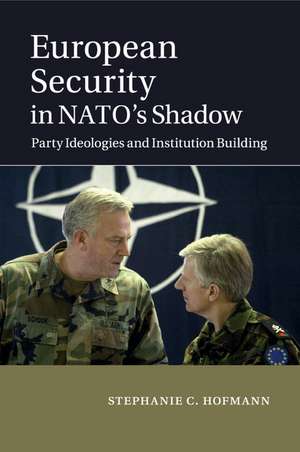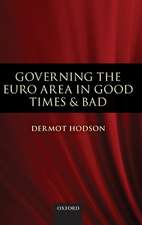European Security in NATO's Shadow: Party Ideologies and Institution Building
Autor Stephanie C. Hofmannen Limba Engleză Paperback – 14 ian 2015
Preț: 279.84 lei
Nou
Puncte Express: 420
Preț estimativ în valută:
53.58€ • 55.79$ • 44.46£
53.58€ • 55.79$ • 44.46£
Carte tipărită la comandă
Livrare economică 14-28 februarie
Preluare comenzi: 021 569.72.76
Specificații
ISBN-13: 9781107521735
ISBN-10: 1107521734
Pagini: 278
Ilustrații: 9 b/w illus. 8 tables
Dimensiuni: 152 x 229 x 15 mm
Greutate: 0.38 kg
Editura: Cambridge University Press
Colecția Cambridge University Press
Locul publicării:New York, United States
ISBN-10: 1107521734
Pagini: 278
Ilustrații: 9 b/w illus. 8 tables
Dimensiuni: 152 x 229 x 15 mm
Greutate: 0.38 kg
Editura: Cambridge University Press
Colecția Cambridge University Press
Locul publicării:New York, United States
Cuprins
1. Introduction; 2. Political party ideology and security cooperation; 3. The success and failure of European security cooperation; 4. The end of the Cold War and the Maastricht Treaty - the Common Foreign and Security Policy; 5. Renegotiating Maastricht at Amsterdam - the failure to go beyond CFSP; 6. Saint Malo, Cologne, and Nice - the creation of the robust ESDP; 7. Conclusion.
Recenzii
'Using European security initiatives as a test case, Stephanie C. Hofmann shows that the convergence of party ideologies across countries creates opportunities for international cooperation. Sharply argued, carefully researched and well written, this book makes the exciting argument that party ideologies matter in international relations. Hofmann also shows that it is impossible to understand European security initiatives such as CFSP and ESDP without taking into account the presence of an alternative, namely NATO, which makes the creation of a new European institution costly and perhaps superfluous unless one factors ideological preferences in.' Frédéric Mérand, University of Montréal
'Debates over European security too often stress its sui generis nature. In this important new book, Stephanie Hofmann argues that its study should instead be grounded in broader debates and theoretical schools within comparative politics and international relations. Adopting a resolutely eclectic stand, Hofmann argues - and shows in richly documented case studies - that security cooperation in Europe can only be understood if we build systematic linkages between the international and the domestic. Indeed, domestic politics - in the form of political parties and their ideologies - play a central role in explaining why Europeans have persisted in efforts at security cooperation 'in NATO's shadow'. Hofmann's book is thus a must read for Europeanists as well as the broader community of international relations scholars.' Jeffrey T. Checkel, Simons Chair in International Law and Human Security, Simon Fraser University and Research Professor, Peace Research Institute, Oslo
'This gem of a book bundles what we know from existing theories of international relations and domestic party politics and refracts that knowledge in an analytically subtle and original manner. Beautifully written, this book yields fresh insights into the largely unknown evolution of European security during the past two decades.' Peter J. Katzenstein, Walter S. Carpenter, Jr Professor of International Studies, Cornell University
'By bridging the fields of comparative politics and international relations, this book provides a unique and superb analysis of the way party ideology informs intergovernmental bargaining on matters of international security. It is a must-read for all students of party politics, international security and European politics.' Catherine E. de Vries, University of Oxford
'NATO has cast a long shadow over efforts to carve out an autonomous European defence capability. Why these efforts have persisted and why they have reached fruition in the guise of the European Security and Defence Policy of the EU are matters deftly and expertly dealt with in this volume. Hofmann offers an explanation that focuses less on inter-state negotiation and the institutional rivalries of NATO and the EU, and more on the ideological configurations of domestic politics. Focusing principally on France, Germany and the UK, we are offered an approach that breaks new ground in its view of domestic preferences as an explanation of foreign policy and institutional development. At a time when the shadow of NATO may be waning, this is an important route to understanding just how durable is the EU as the basis of a greater European responsibility in international affairs.' Mark Webber, University of Birmingham
'It is one of the few books to truly advance the theoretical debate on the CSDP, and also on contemporary Western foreign policy more generally. If that is not enough, it is also very readable, supported by informative illustrations, and convincingly embedded into the diverse strands of theoretical literature that it brings together. All future analyses of EU security policy should therefore have to seriously engage with European Security in NATO's Shadow.' Benjamin Pohl, Canadian Journal of Political Science
'Most people in the United States ask why Europe does not do more to take responsibility for its own defence. Stephanie Hofmann asks why Europeans would bother … Hofmann's question is important because a more autonomous European security identity is a long-standing goal … Now that relations with Russia have deteriorated and the Middle East remains unsettled, it may be time for Europeans to start thinking about how to secure their collective interests with or without the active participation of the United States.' Eric Jones, Survival
'Debates over European security too often stress its sui generis nature. In this important new book, Stephanie Hofmann argues that its study should instead be grounded in broader debates and theoretical schools within comparative politics and international relations. Adopting a resolutely eclectic stand, Hofmann argues - and shows in richly documented case studies - that security cooperation in Europe can only be understood if we build systematic linkages between the international and the domestic. Indeed, domestic politics - in the form of political parties and their ideologies - play a central role in explaining why Europeans have persisted in efforts at security cooperation 'in NATO's shadow'. Hofmann's book is thus a must read for Europeanists as well as the broader community of international relations scholars.' Jeffrey T. Checkel, Simons Chair in International Law and Human Security, Simon Fraser University and Research Professor, Peace Research Institute, Oslo
'This gem of a book bundles what we know from existing theories of international relations and domestic party politics and refracts that knowledge in an analytically subtle and original manner. Beautifully written, this book yields fresh insights into the largely unknown evolution of European security during the past two decades.' Peter J. Katzenstein, Walter S. Carpenter, Jr Professor of International Studies, Cornell University
'By bridging the fields of comparative politics and international relations, this book provides a unique and superb analysis of the way party ideology informs intergovernmental bargaining on matters of international security. It is a must-read for all students of party politics, international security and European politics.' Catherine E. de Vries, University of Oxford
'NATO has cast a long shadow over efforts to carve out an autonomous European defence capability. Why these efforts have persisted and why they have reached fruition in the guise of the European Security and Defence Policy of the EU are matters deftly and expertly dealt with in this volume. Hofmann offers an explanation that focuses less on inter-state negotiation and the institutional rivalries of NATO and the EU, and more on the ideological configurations of domestic politics. Focusing principally on France, Germany and the UK, we are offered an approach that breaks new ground in its view of domestic preferences as an explanation of foreign policy and institutional development. At a time when the shadow of NATO may be waning, this is an important route to understanding just how durable is the EU as the basis of a greater European responsibility in international affairs.' Mark Webber, University of Birmingham
'It is one of the few books to truly advance the theoretical debate on the CSDP, and also on contemporary Western foreign policy more generally. If that is not enough, it is also very readable, supported by informative illustrations, and convincingly embedded into the diverse strands of theoretical literature that it brings together. All future analyses of EU security policy should therefore have to seriously engage with European Security in NATO's Shadow.' Benjamin Pohl, Canadian Journal of Political Science
'Most people in the United States ask why Europe does not do more to take responsibility for its own defence. Stephanie Hofmann asks why Europeans would bother … Hofmann's question is important because a more autonomous European security identity is a long-standing goal … Now that relations with Russia have deteriorated and the Middle East remains unsettled, it may be time for Europeans to start thinking about how to secure their collective interests with or without the active participation of the United States.' Eric Jones, Survival
Notă biografică
Descriere
This book asks why European countries tried to build a security institution outside of NATO, emphasising the influence of political party ideologies.

















